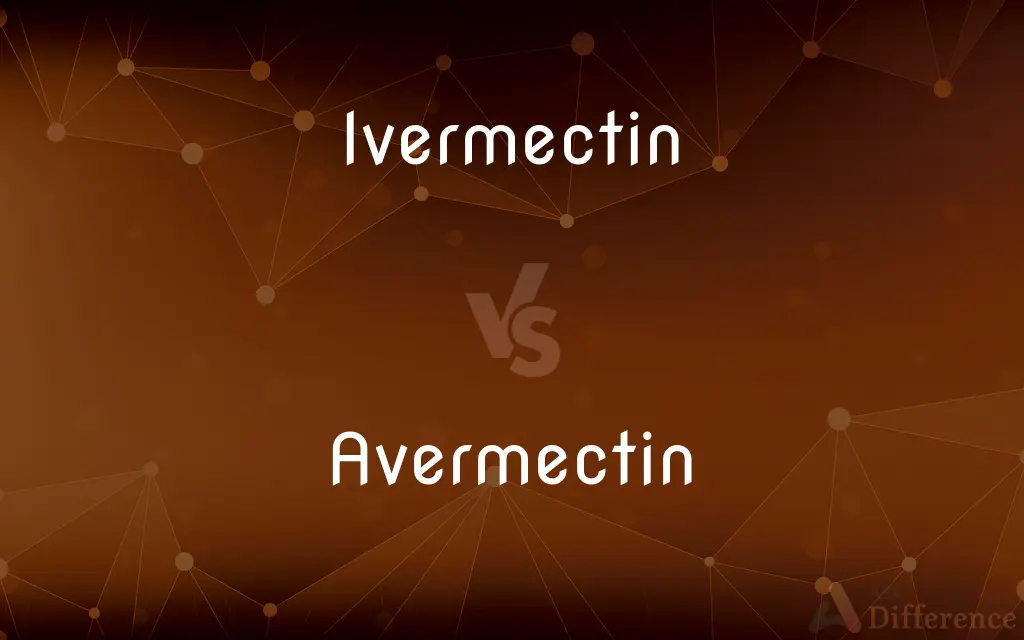Ivermectin vs. Avermectin — What's the Difference?
By Maham Liaqat & Fiza Rafique — Updated on February 21, 2024
Ivermectin, a derivative of avermectin, is widely used to treat parasitic infections in humans and animals. Avermectin, its precursor, is a natural substance from soil bacteria, primarily used in veterinary medicine and agriculture.

Difference Between Ivermectin and Avermectin
Table of Contents
ADVERTISEMENT
Key Differences
Ivermectin, developed from avermectin, is an antiparasitic medication with a broad range of applications, including treating river blindness and scabies in humans, as well as parasitic infections in animals. It works by interfering with the nerve and muscle functions of parasites. Avermectin, a mixture of naturally occurring compounds, serves as the basis for ivermectin. It was discovered in soil bacteria and is utilized in agriculture to control insect pests, as well as in veterinary medicine for parasite control.
The effectiveness of ivermectin against various parasites has made it a critical tool in public health, particularly in campaigns against river blindness in Africa. Avermectin, while potent against agricultural pests and animal parasites, is less commonly used directly in human medicine due to its raw form and potential toxicity.
Ivermectin's safety profile and efficacy in humans have been well-established, leading to its inclusion in the World Health Organization's list of essential medicines. Avermectin, on the other hand, is primarily formulated for non-human use, with its derivatives being modified to enhance safety and efficacy for specific applications.
Both ivermectin and avermectin have revolutionized parasite control in their respective fields, but ivermectin's adaptability for human use marks a significant advancement from its parent compound, avermectin. This transition from an agricultural and veterinary product to a vital human medicine underscores the importance of pharmaceutical development in expanding the applications of natural substances.
Comparison Chart
Origin
Semi-synthetic derivative of avermectin.
Natural product from soil bacteria Streptomyces avermitilis.
ADVERTISEMENT
Primary Use
Treat parasitic infections in humans and animals.
Control parasites in animals and pests in agriculture.
Human Medicine
Widely used, especially for river blindness and scabies.
Less commonly used directly due to potential toxicity.
Veterinary Use
Used for a broad range of internal and external parasites.
Primarily for external parasites and in agriculture.
Mode of Action
Interferes with nerve and muscle function of parasites.
Similar, but with a broader range of compounds.
Safety Profile
Generally well-tolerated in humans and animals.
More toxic, used cautiously in non-human applications.
Compare with Definitions
Ivermectin
A medication used to treat many types of parasite infestations.
Ivermectin is effective against river blindness.
Avermectin
The parent compound of ivermectin.
Researchers derived ivermectin from avermectin to increase its safety and efficacy.
Ivermectin
Administered orally, topically, or by injection.
The doctor prescribed oral ivermectin for the scabies infection.
Avermectin
A natural substance from soil bacteria used as a pesticide.
Avermectin is applied to crops to control insect pests.
Ivermectin
Derived from avermectin to be safer and more effective.
Ivermectin was developed through the modification of avermectin.
Avermectin
Contains a mixture of different compounds.
Avermectin's effectiveness is due to its complex mixture of avermectins.
Ivermectin
Included in the WHO's list of essential medicines.
Ivermectin's impact on global health earned it a spot on the essential medicines list.
Avermectin
Used in veterinary medicine to control parasites.
Avermectin is used in topical treatments for mites in animals.
Ivermectin
Used in both human and veterinary medicine.
Ivermectin is commonly used to deworm livestock.
Avermectin
Applied in agriculture for pest control.
Farmers use avermectin-based products to protect their crops from insects.
Ivermectin
Ivermectin, sold under the brand name Stromectol among others, is a medication that is used to treat parasite infestations. In humans, this includes head lice, scabies, river blindness (onchocerciasis), strongyloidiasis, trichuriasis, ascariasis, and lymphatic filariasis.
Avermectin
The avermectins are a series of drugs and pesticides used to treat parasitic worms and insect pests. They are a group of 16-membered macrocyclic lactone derivatives with potent anthelmintic and insecticidal properties.
Avermectin
(medicine) Any of a class of macrocyclic lactones, produced by Streptomyces bacteria, that are used medically to kill parasites.
Common Curiosities
How do ivermectin and avermectin work?
Both interfere with the nerve and muscle function of parasites, leading to their paralysis and death, but ivermectin is specifically tailored for broader and safer use.
Can avermectin be used directly in human medicine?
Avermectin is primarily used in agriculture and veterinary medicine due to its potential toxicity, with its derivatives like ivermectin being more suitable for human use.
Why is ivermectin considered an essential medicine?
Its effectiveness against a wide range of parasitic infections, especially in treating conditions like river blindness, makes it crucial for public health.
Is avermectin still used if ivermectin is available?
Avermectin continues to be used in agricultural and veterinary contexts, where its broad spectrum and potency against pests and parasites are valuable.
Is resistance to ivermectin a growing concern?
Yes, there is increasing concern about the development of resistance to ivermectin among certain parasites, necessitating careful management and use.
Are there any natural alternatives to ivermectin and avermectin?
While natural alternatives exist, such as certain plant extracts with antiparasitic properties, their efficacy and safety profiles vary and are generally less studied than ivermectin.
Can ivermectin be used for all types of parasites?
Ivermectin is effective against many, but not all, parasites, and its use depends on the specific type of infection and parasite involved.
What is the main difference between ivermectin and avermectin?
Ivermectin is a semi-synthetic derivative of avermectin, formulated to be safer and more effective for use in humans and animals.
Are there any safety concerns with using ivermectin in humans?
Ivermectin is generally well-tolerated, but it must be used under medical supervision, especially considering dosages and potential interactions.
How has the development of ivermectin from avermectin impacted medicine?
It has significantly advanced the treatment of parasitic infections in humans, contributing to major public health campaigns against diseases like river blindness.
How is avermectin applied in agricultural settings?
Avermectin is applied as a spray or soil treatment to control infestations of nematodes, mites, and insects on a variety of crops.
What are the common side effects of ivermectin?
Side effects can include skin rash, nausea, vomiting, diarrhea, stomach pain, facial or limb swelling, neurologic adverse events, and potentially severe hepatitis in rare cases.
Can ivermectin be used preventatively for parasites?
Yes, in some cases, ivermectin is used as a prophylactic treatment against certain parasitic infections, especially in veterinary medicine.
Can avermectin be toxic to beneficial insects or animals?
Avermectin can be toxic to non-target species, including beneficial insects and aquatic organisms, requiring careful application and environmental consideration.
What measures can be taken to prevent ivermectin resistance?
Rotating antiparasitic drugs, using the correct dosages, and implementing integrated pest management strategies can help prevent resistance.
How is ivermectin administered to animals?
For animals, ivermectin is administered through oral tablets, injectables, or topical solutions, depending on the type of animal and the condition being treated.
Share Your Discovery

Previous Comparison
Giganotosaurus vs. Tyrannosaurus
Next Comparison
Quote vs. OfferAuthor Spotlight
Written by
Maham LiaqatCo-written by
Fiza RafiqueFiza Rafique is a skilled content writer at AskDifference.com, where she meticulously refines and enhances written pieces. Drawing from her vast editorial expertise, Fiza ensures clarity, accuracy, and precision in every article. Passionate about language, she continually seeks to elevate the quality of content for readers worldwide.














































